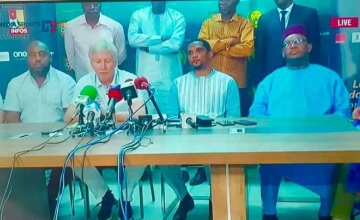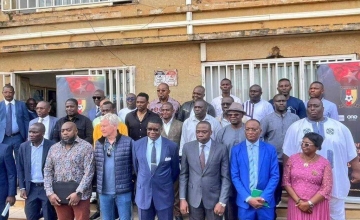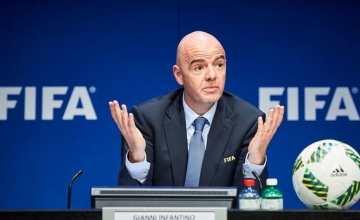
PUMA statement concerning the Cameroon UniQT and the recent ruling of the FIFA Disciplinary Committee
On April 16th 2004, the FIFA Disciplinary Committee issued a press statement, which announced that the Cameroon National Football Team has had six points deducted from its 2006 World Cup qualification campaign. In addition the Cameroon Football Association (Fédération Camerounaise de Football – Fecafoot) has also been fined CHF 200.000. The FIFA sanctions were imposed as a consequence of Cameroon’s failure to comply with the equipment requirements as per Law 4 of the FIFA “Laws of the Game” at the recent 2004 Confédération Africaine de Football (CAF) African Cup of Nations in Tunisia when the Cameroon National Team wore their one-piece playing kit (aka Cameroon UniQT) in the three group stage matches as well as in the quarterfinal versus Nigeria.
As the official supplier to Fecafoot, PUMA A.G. has decided to give the following statement to account for PUMA’s and Fecafoot’s joint actions before, during and after the 2004 African Cup of Nations. Statement provided by PUMA Chairman and CEO Jochen Zeitz.
"As one of the most complex performance enhancing football playing kit solutions to be introduced in years, the Cameroon UniQT is the result of a long term development process. The kit was specifically designed with the Cameroon players in mind – taking into account the team’s confidence, athleticism and sheer power. Both PUMA and Fecafoot carefully researched the FIFA Laws of the Game and the corresponding ratified FIFA Equipment Regulations to find no specification, which prohibited a one-piece kit".
 “It goes without saying that Fecafoot and PUMA would never jeopardize the team by entering a top international football competition, such as the African Cup of Nations, blind. The only potential concern found was coloration of the kit. Consequently, for the African Cup of Nations, PUMA created three different one-piece combinations with a color change at the waistband to differentiate the shirt and short to avoid a conflict with the opposing team. These three combinations were identical to the traditional shirt, short and sock combinations worn by the team in past tournaments as approved by FIFA and CAF. In addition, the authorization of the official playing kits (home, away and third) followed the FIFA approval system whereby the local governing body, CAF in this case, signed off on the new one-piece kit design. This approval followed the encouragement by FIFA to present the playing kit to the responsible competition body in question, at a meeting with CAF representatives in Cairo on October 24th 2003. Once approved by CAF, PUMA and Fecafoot proceeded with the finalization of the one-piece playing kit accordingly.”
“On December 22nd 2003, PUMA launched a pan-European TV campaign, following an official press announcement on December 17th, featuring Cameroon internationals Samuel Eto’o and Eric Djemba Djemba, which fully revealed the new playing kit. There were no comments or enquiries by FIFA regarding the kit until January 23rd, after which FIFA intervened to overrule CAF’s previous approval. Cameroon proceeded to wear the one-piece playing kit during the group stage of the African Cup of Nations. CAF, the supreme authority of the tournament as authorised and sanctioned by FIFA, is later informed by the Fecafoot delegation on February 4th that the kit supplier is unable to deliver an alternative playing kit for the quarterfinal. On February 6th the CAF 2004 Organizing Committee, ultimately responsible for the tournament in Tunisia, decides to stick to its initial approval and allows Cameroon to wear the one-piece playing kit in the quarterfinal against Nigeria.”
“FIFA’s current disciplinary ruling against Cameroon is without merit and has no precedent in the world of football. Fecafoot and its supplier has acted in complete faith with FIFA’s slogan, ‘For the Good of the Game’; by sticking to the Laws of the Game, by receiving prior approval of the playing equipment and presenting a performance enhancing solution that counteracts shirt pulling, eliminates goal gestures where players take off their shirts and also prevents players from swapping shirts after the final whistle. All of these actions are in line with FIFA initiatives. Furthermore, the one-piece Cameroon playing attire does not present the team with any unfair competitive advantage or put the team’s opponents in danger.”
“Under the circumstances, the fine itself is totally undeserved whereas the point deduction for the World Cup qualification is nothing but outrageous. The imposed sanction does not apply to the tournament, the CAF African Cup of Nations, where, according to the FIFA Disciplinary Committee, this serious infringement of the Laws of the Game occurred. PUMA will continue to defend and support Cameroon in their effort to push the boundaries of the game and challenge the preposterous ruling against the team.”
Note:
As a consequence of the FIFA intervention during the 2004 African Cup of Nations, PUMA has now supplied Cameroon with a two piece kit ahead of the team’s Wednesday, April 28th, friendly match away to Bulgaria.
© http://www.pumafootball.com/
“It goes without saying that Fecafoot and PUMA would never jeopardize the team by entering a top international football competition, such as the African Cup of Nations, blind. The only potential concern found was coloration of the kit. Consequently, for the African Cup of Nations, PUMA created three different one-piece combinations with a color change at the waistband to differentiate the shirt and short to avoid a conflict with the opposing team. These three combinations were identical to the traditional shirt, short and sock combinations worn by the team in past tournaments as approved by FIFA and CAF. In addition, the authorization of the official playing kits (home, away and third) followed the FIFA approval system whereby the local governing body, CAF in this case, signed off on the new one-piece kit design. This approval followed the encouragement by FIFA to present the playing kit to the responsible competition body in question, at a meeting with CAF representatives in Cairo on October 24th 2003. Once approved by CAF, PUMA and Fecafoot proceeded with the finalization of the one-piece playing kit accordingly.”
“On December 22nd 2003, PUMA launched a pan-European TV campaign, following an official press announcement on December 17th, featuring Cameroon internationals Samuel Eto’o and Eric Djemba Djemba, which fully revealed the new playing kit. There were no comments or enquiries by FIFA regarding the kit until January 23rd, after which FIFA intervened to overrule CAF’s previous approval. Cameroon proceeded to wear the one-piece playing kit during the group stage of the African Cup of Nations. CAF, the supreme authority of the tournament as authorised and sanctioned by FIFA, is later informed by the Fecafoot delegation on February 4th that the kit supplier is unable to deliver an alternative playing kit for the quarterfinal. On February 6th the CAF 2004 Organizing Committee, ultimately responsible for the tournament in Tunisia, decides to stick to its initial approval and allows Cameroon to wear the one-piece playing kit in the quarterfinal against Nigeria.”
“FIFA’s current disciplinary ruling against Cameroon is without merit and has no precedent in the world of football. Fecafoot and its supplier has acted in complete faith with FIFA’s slogan, ‘For the Good of the Game’; by sticking to the Laws of the Game, by receiving prior approval of the playing equipment and presenting a performance enhancing solution that counteracts shirt pulling, eliminates goal gestures where players take off their shirts and also prevents players from swapping shirts after the final whistle. All of these actions are in line with FIFA initiatives. Furthermore, the one-piece Cameroon playing attire does not present the team with any unfair competitive advantage or put the team’s opponents in danger.”
“Under the circumstances, the fine itself is totally undeserved whereas the point deduction for the World Cup qualification is nothing but outrageous. The imposed sanction does not apply to the tournament, the CAF African Cup of Nations, where, according to the FIFA Disciplinary Committee, this serious infringement of the Laws of the Game occurred. PUMA will continue to defend and support Cameroon in their effort to push the boundaries of the game and challenge the preposterous ruling against the team.”
Note:
As a consequence of the FIFA intervention during the 2004 African Cup of Nations, PUMA has now supplied Cameroon with a two piece kit ahead of the team’s Wednesday, April 28th, friendly match away to Bulgaria.
© http://www.pumafootball.com/
 “It goes without saying that Fecafoot and PUMA would never jeopardize the team by entering a top international football competition, such as the African Cup of Nations, blind. The only potential concern found was coloration of the kit. Consequently, for the African Cup of Nations, PUMA created three different one-piece combinations with a color change at the waistband to differentiate the shirt and short to avoid a conflict with the opposing team. These three combinations were identical to the traditional shirt, short and sock combinations worn by the team in past tournaments as approved by FIFA and CAF. In addition, the authorization of the official playing kits (home, away and third) followed the FIFA approval system whereby the local governing body, CAF in this case, signed off on the new one-piece kit design. This approval followed the encouragement by FIFA to present the playing kit to the responsible competition body in question, at a meeting with CAF representatives in Cairo on October 24th 2003. Once approved by CAF, PUMA and Fecafoot proceeded with the finalization of the one-piece playing kit accordingly.”
“On December 22nd 2003, PUMA launched a pan-European TV campaign, following an official press announcement on December 17th, featuring Cameroon internationals Samuel Eto’o and Eric Djemba Djemba, which fully revealed the new playing kit. There were no comments or enquiries by FIFA regarding the kit until January 23rd, after which FIFA intervened to overrule CAF’s previous approval. Cameroon proceeded to wear the one-piece playing kit during the group stage of the African Cup of Nations. CAF, the supreme authority of the tournament as authorised and sanctioned by FIFA, is later informed by the Fecafoot delegation on February 4th that the kit supplier is unable to deliver an alternative playing kit for the quarterfinal. On February 6th the CAF 2004 Organizing Committee, ultimately responsible for the tournament in Tunisia, decides to stick to its initial approval and allows Cameroon to wear the one-piece playing kit in the quarterfinal against Nigeria.”
“FIFA’s current disciplinary ruling against Cameroon is without merit and has no precedent in the world of football. Fecafoot and its supplier has acted in complete faith with FIFA’s slogan, ‘For the Good of the Game’; by sticking to the Laws of the Game, by receiving prior approval of the playing equipment and presenting a performance enhancing solution that counteracts shirt pulling, eliminates goal gestures where players take off their shirts and also prevents players from swapping shirts after the final whistle. All of these actions are in line with FIFA initiatives. Furthermore, the one-piece Cameroon playing attire does not present the team with any unfair competitive advantage or put the team’s opponents in danger.”
“Under the circumstances, the fine itself is totally undeserved whereas the point deduction for the World Cup qualification is nothing but outrageous. The imposed sanction does not apply to the tournament, the CAF African Cup of Nations, where, according to the FIFA Disciplinary Committee, this serious infringement of the Laws of the Game occurred. PUMA will continue to defend and support Cameroon in their effort to push the boundaries of the game and challenge the preposterous ruling against the team.”
Note:
As a consequence of the FIFA intervention during the 2004 African Cup of Nations, PUMA has now supplied Cameroon with a two piece kit ahead of the team’s Wednesday, April 28th, friendly match away to Bulgaria.
© http://www.pumafootball.com/
“It goes without saying that Fecafoot and PUMA would never jeopardize the team by entering a top international football competition, such as the African Cup of Nations, blind. The only potential concern found was coloration of the kit. Consequently, for the African Cup of Nations, PUMA created three different one-piece combinations with a color change at the waistband to differentiate the shirt and short to avoid a conflict with the opposing team. These three combinations were identical to the traditional shirt, short and sock combinations worn by the team in past tournaments as approved by FIFA and CAF. In addition, the authorization of the official playing kits (home, away and third) followed the FIFA approval system whereby the local governing body, CAF in this case, signed off on the new one-piece kit design. This approval followed the encouragement by FIFA to present the playing kit to the responsible competition body in question, at a meeting with CAF representatives in Cairo on October 24th 2003. Once approved by CAF, PUMA and Fecafoot proceeded with the finalization of the one-piece playing kit accordingly.”
“On December 22nd 2003, PUMA launched a pan-European TV campaign, following an official press announcement on December 17th, featuring Cameroon internationals Samuel Eto’o and Eric Djemba Djemba, which fully revealed the new playing kit. There were no comments or enquiries by FIFA regarding the kit until January 23rd, after which FIFA intervened to overrule CAF’s previous approval. Cameroon proceeded to wear the one-piece playing kit during the group stage of the African Cup of Nations. CAF, the supreme authority of the tournament as authorised and sanctioned by FIFA, is later informed by the Fecafoot delegation on February 4th that the kit supplier is unable to deliver an alternative playing kit for the quarterfinal. On February 6th the CAF 2004 Organizing Committee, ultimately responsible for the tournament in Tunisia, decides to stick to its initial approval and allows Cameroon to wear the one-piece playing kit in the quarterfinal against Nigeria.”
“FIFA’s current disciplinary ruling against Cameroon is without merit and has no precedent in the world of football. Fecafoot and its supplier has acted in complete faith with FIFA’s slogan, ‘For the Good of the Game’; by sticking to the Laws of the Game, by receiving prior approval of the playing equipment and presenting a performance enhancing solution that counteracts shirt pulling, eliminates goal gestures where players take off their shirts and also prevents players from swapping shirts after the final whistle. All of these actions are in line with FIFA initiatives. Furthermore, the one-piece Cameroon playing attire does not present the team with any unfair competitive advantage or put the team’s opponents in danger.”
“Under the circumstances, the fine itself is totally undeserved whereas the point deduction for the World Cup qualification is nothing but outrageous. The imposed sanction does not apply to the tournament, the CAF African Cup of Nations, where, according to the FIFA Disciplinary Committee, this serious infringement of the Laws of the Game occurred. PUMA will continue to defend and support Cameroon in their effort to push the boundaries of the game and challenge the preposterous ruling against the team.”
Note:
As a consequence of the FIFA intervention during the 2004 African Cup of Nations, PUMA has now supplied Cameroon with a two piece kit ahead of the team’s Wednesday, April 28th, friendly match away to Bulgaria.
© http://www.pumafootball.com/ 










